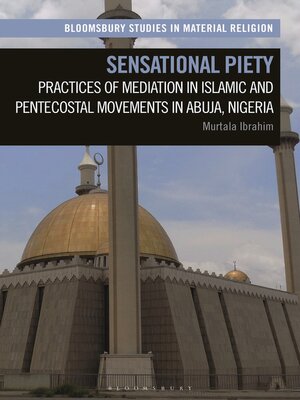Sensational Piety
ebook ∣ Practices of Mediation in Islamic and Pentecostal Movements in Abuja, Nigeria · Bloomsbury Studies in Material Religion
By Murtala Ibrahim

Sign up to save your library
With an OverDrive account, you can save your favorite libraries for at-a-glance information about availability. Find out more about OverDrive accounts.
Find this title in Libby, the library reading app by OverDrive.



Search for a digital library with this title
Title found at these libraries:
| Library Name | Distance |
|---|---|
| Loading... |
Grounded in anthropological comparison and the concept of materiality, this book offers an in-depth ethnographic study of the similarities and differences among various forms of religious practices in a Pentecostal Church (Christ Embassy) and an Islamic group (NASFAT) in the Nigerian capital of Abuja.
Scholarship in this area tends to focus on inter-religious contestations and conflicts; however, this book proposes that another dynamic is unfolding between Christians and Muslims that is characterised by conviviality, interfaith joint action programmes, mutual influences and even the exchange of religious forms. The comparative approach reveals that, notwithstanding the seemingly opposed worldviews and divergences between Muslims and Christians, they all face similar challenges and apply similar techniques for meeting the challenges posed by the precarious Nigerian urban environment. It is through practices – especially those conducted in (semi-) public settings – that people from different religious persuasions define, encroach on and feel the weight of each other's presence.
Scholarship in this area tends to focus on inter-religious contestations and conflicts; however, this book proposes that another dynamic is unfolding between Christians and Muslims that is characterised by conviviality, interfaith joint action programmes, mutual influences and even the exchange of religious forms. The comparative approach reveals that, notwithstanding the seemingly opposed worldviews and divergences between Muslims and Christians, they all face similar challenges and apply similar techniques for meeting the challenges posed by the precarious Nigerian urban environment. It is through practices – especially those conducted in (semi-) public settings – that people from different religious persuasions define, encroach on and feel the weight of each other's presence.







